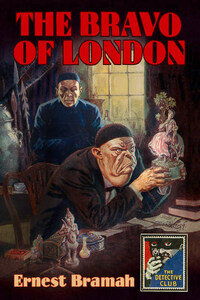"I suppose I am old-fashioned" – there was a murmur of polite dissent from all the ladies present, except the one addressed – "Oh, I take it as a compliment nowadays, I assure you; but when I was a girl a young lady would have no more thought of flying than of" – she paused almost on a note of pained surprise at finding the familiar comparison of a lifetime cut off – "well, of standing on her head."
"No," replied the young lady in point, with the unfeeling candour that marked the youthful spirit of the age, "because it wasn't invented. But you went bicycling, and your mothers were very shocked at first."
"I hardly think that you can say that, Miss Lisle," remarked another of the matrons, "because I can remember that more than twenty years ago one used to see quite elderly ladies bicycling."
"After the others had lived all the ridicule down," retorted Miss Lisle scornfully. "Oh yes; I quite expect that in a few more years you will see quite elderly ladies flying."
The little party of matrons seated on the Hastings promenade regarded each other surreptitiously, and one or two smiled slightly, while one or two shuddered slightly. "Flying is very different, dear," said Mrs Lisle reprovingly. "I often think of what your dear grandfather used to say. He said" – impressively – "that if the Almighty had intended that we should fly, He would have sent us into the world with wings upon our backs."
There was a murmur of approval from all – all except Miss Lisle, that is.
"But do you ever think of what Geoffrey replied to dear grandpapa when he heard him say that once, mother?" said the unimpressed daughter. "He said: 'And don't you think, sir, that if the Almighty had intended us to use railways, He would have sent us into the world with wheels upon our feet?'"
"I do not see any connection at all between the two things," replied her mother distantly. "And such a remark seems to me to be simply irreverent. Birds are born with wings, and insects, and so on, but nothing, as far as I am aware, is born with wheels. Your grandfather used to travel by the South Eastern regularly every day, or how could he have reached his office? and he never saw anything wrong in using trains, I am sure. In fact, when you think of it you will see that what Geoffrey said, instead of being any argument, was supremely silly."
"Perhaps he intended it to be," replied Miss Lisle with suspicious meekness. "You never know, mother."
Such a remark merited no serious attention. Why should any one, least of all a really clever young man like Geoffrey, deliberately intend to be silly? There was too often, her mother had observed, an utter lack of relevance in Irene's remarks.
"I think that it is a great mistake to have white flying costumes as so many do," observed another lady. "They look – but perhaps they wish to."
"Certainly when they use lace as well it really seems as though they do. Oh!"
There was a passing shadow across the group and a slight rustle in the air. Scarcely a dozen yards above the promenade a young lady was flying strongly down the wind with the languid motion of the "swan stroke." She wore white – and lace trimming. Mrs Lisle gazed fixedly out to sea. Even Irene felt that the vision was inopportune.
"There are always some who overdo a thing," she remarked. "There always have been. That was only Velma St Saint of the New Gaiety; she flies about the front every day for the advertisement of the thing: I wonder that she doesn't drop handbills as she goes. There's plenty of room up on the Castle Hill – in fact, you aren't supposed to fly west of the Breakwater – but there will always be some – " A vague resentment closed the period.
"Are you staying at the Palatial this time?" asked the lady who had mentioned lace, feeling it tactful to change the subject. "I think that you used to."
"Oh, haven't you seen?" was the reply. "The Palatial has been closed for the last six months."
"Yes, it's a great pity," remarked another. "It looks so depressing too, right on the front. But they simply could not go on. I suppose that the rates here are something frightful now."
"Oh, enormous, my dear; but it was not that alone. The Palatial has always aimed at being a 'popular' hotel, and so few of the upper middle class can afford hotels now. Then the new tax on every servant above one – calculated as fifty per cent. of their wages, I think, but there are so many new taxes to remember – proved the last straw."
"Yes, it is fifty per cent. I remember because I had to give up my between-maid to pay the cook's tax. But I thought that hotels were to be exempt?"
"Not in the end. It was argued that hotels existed for the convenience of the monied classes, and that they ought to pay for it. So a large number of hotels are closed altogether; others work with a reduced staff, and a great many servants have been thrown out of employment."
Miss Lisle laughed unpleasantly. "A good thing, too," she remarked. "I hate hotel servants. So does everybody. It is the only good thing I have heard of the Labour Government doing."










